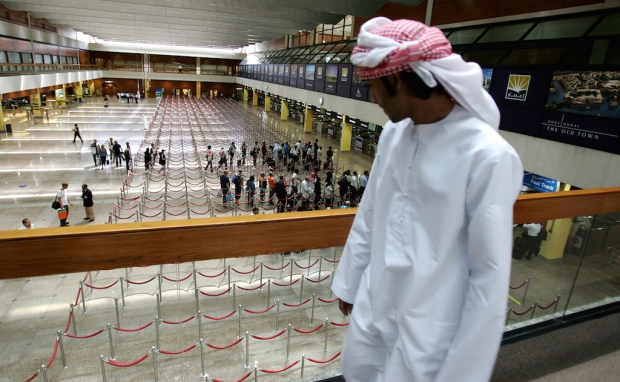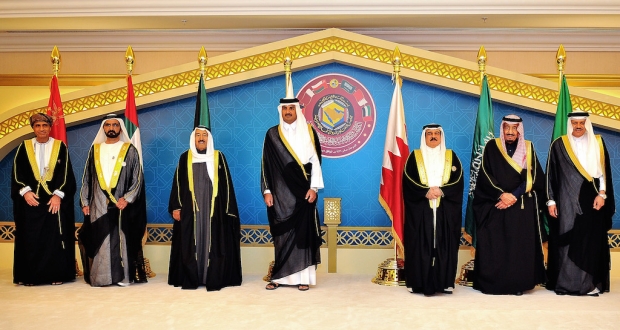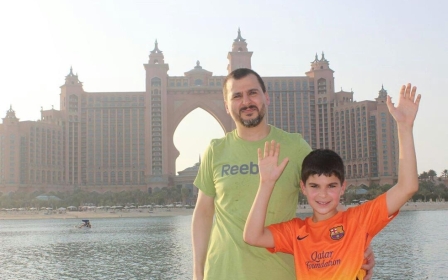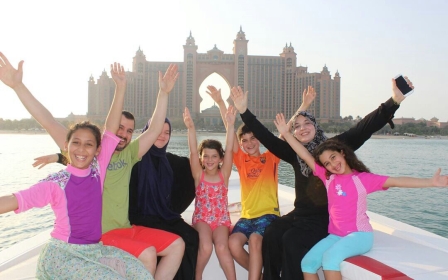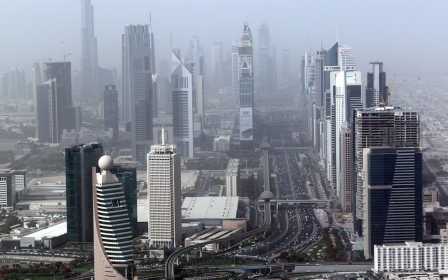A Qatari citizen's two years of abuse and false imprisonment by the UAE
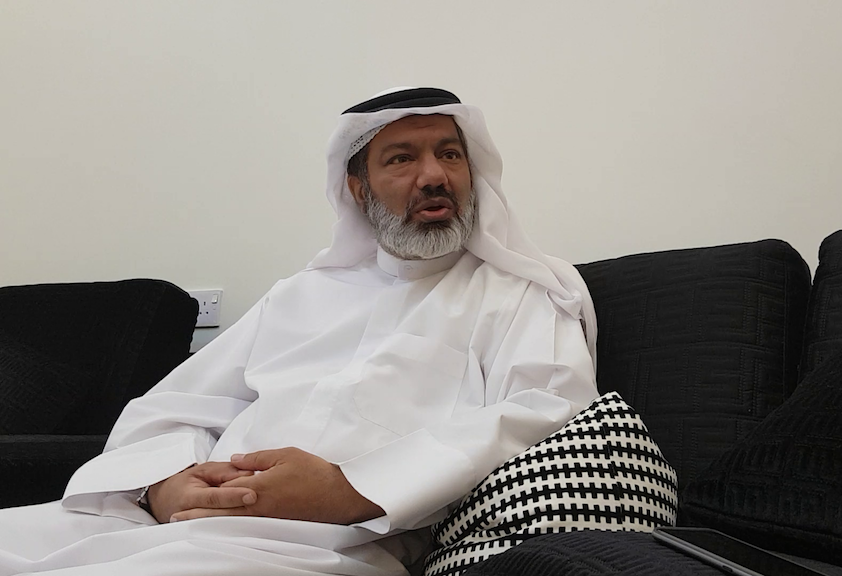
DOHA, Qatar - A Qatari citizen has for the first time described his torture and false imprisonment at the hands of the United Arab Emirates, in an exclusive interview with Middle East Eye.
Speaking from his home in Doha, air conditioning whirring away against the sweltering summer heat, Mahmoud al-Jaidah described a two-year-ordeal in which he became a Kafkaesque pawn in the Gulf states' regional power struggle, suffering abuse, isolation and mental anguish at the hands of the Dubai authorities.
Jaidah, a medical doctor at Qatar Petroleum, was arrested in Dubai in February 2013, while returning from a trip to Thailand to visit his brother, who had suffered a stroke. He received news that his wife needed an operation in Bahrain and so returned to the Gulf to see her, via Dubai airport.
He said 'We will kill you, nobody will know about you. We have here a grave, we will kill you, nobody will know'
- Mahmoud al-Jaidah
While at the aiport, he made a visit to a mosque to perform the Maghrib evening prayers. Returning to the airport, he was stopped by a security guard at immigration control.
After being searched and questioned, Jaidah was asked to come to the police station to put his signature to a document confirming the authorities had interviewed him.
"I said 'No I will not go, I need my embassy to talk to them and I need my lawyer.'
"He said 'OK, you are right, just come to the police station, we will allow you to talk to your embassy in there'."
Jaidah was taken to a car where he was surprised to find his hands bound and his eyes blindfolded. He was taken to a building in an unknown location, where he was forced to change from his traditional thawb into pyjamas.
After being led down a corridor, again blindfolded, he was subjected to the first of what were to be many interrogations, all largely focusing on the Qatari government and its relationship with the Muslim Brotherhood and the Palestinian group Hamas.
"He [the interrogator] started asking me 'Why do Qatar interfere in everything?'
"I said, 'I don't know, I cannot answer this. Ask the Qatari government'."
He was asked about whether he knew an Emirati man based in the UAE. Jaidah admitted he had met the man, but did not know him personally. Jaidah would not elaborate on who this Emirati man is.
"So then I said 'I don't know him'. Then one slap in my face came. I was shocked. I have never been slapped since childhood."
The guards then asked him whether he had brought any money to the UAE, accusing him of having brought 100,000 dirhams ($27,000).
"I said 'I never brought any money'. Then they start hitting me with a stick."
The guards subjected Jaidah to repeated beatings leaving him with multiple bruises on his back, neck and legs. For a further three days he was kept in a small cell and repeatedly questioned with no sleep.
At one point, Jaidah claims he was given drugged water, which caused him to begin "laughing without any reason" and become highly talkative.
The Emirati authorities were contacted for comment about Jaidah's claims but had not responded at time of publication.
He was also punched in the stomach, leaving him with abdominal pains, while guards also beat the soles of his feet with sticks for minutes at a time.
He said guards threatened to electrocute him, pull out his fingernails and bury him up to his neck in the sand.
"The guard told me 'Don't worry, even up to killing you, we have the authority'."
"'We will kill you, nobody will know about you. We have here a grave, we will kill you, nobody will know.'"
Brotherhood crackdown
Jaidah would spend six weeks in the secret detention facility with no contact with family members, a lawyer or representative. Under pressure from the physical abuse, he gave the guards numerous fake names of alleged Brotherhood and Hamas supporters, including that of a Palestinian neighbour who had died several years before.
Around the same time, the UAE was undertaking a major crackdown on supporters of Al-Islah, the Emirati branch of the Muslim Brotherhood, which began in 2012.
While Al-Islah had been a legal organisation in the UAE since 1974, the UAE had grown wary of the rising influence of Islamic populists in the region and their promotion of a nominally liberal democratic alternative to established monarchies.
In March 2013, 94 people, all believed to be Al-Islah members, went on trial in Abu Dhabi, accused of building a secret network to plot a coup in the UAE.
For their part, Al-Islah have long claimed they wanted to see the UAE democratised and to open more space for political parties.
Jaidah speculated that his own arrest was driven by the anti-Brotherhood crackdown, despite being a citizen of a neighbouring state.
"I think the UAE want to involve the whole Gulf area in this problem," he said.
"They wanted to show to all GCC countries: 'You should do whatever we are doing'.
Qatar has long maintained close ties with the Muslim Brotherhood and publicly and financially supported the Brotherhood-backed presidency of Mohamed Morsi in Egypt, all of which deeply disturbed the UAE and other Gulf states.
The leadership of Hamas is also based in Doha, though Qatar also maintains relatively open communication with Israel.
Jaidah denied that he had any links to Al-Islah or to the Brotherhood, although he admitted he was a fan of them and their ideologue Yusuf al-Qaradawi, who is also based in Doha.
"I am an Islamic person, I am a religious person, really I like Sheikh Yusuf al-Qaradawi, really I like his books, but I have no relationship with him," he said.
"I know him, he is a famous person, who doesn't know him? I saw him, I attended several lectures by him. But I never visited him, had good relationship with him, took instructions from him as they say."
Just reading, crying, praying. Those were the only things I could do
- Mahmoud al-Jaidah
Eventually, Jaidah said he was "forgotten" by the guards and remained in the detention facility for six weeks, without even being called for interrogation.
After those six weeks he was brought to the public prosecution building where he was finally allowed to see the Qatari ambassador and two of his sons, Hassan and Abdulrahman.
Despite his intense happiness at seeing his family, and assurances from the Qatari ambassador, after 10 minutes the visit was over and he was transferred back to his cell.
Jaidah would spend, in total, eight months in the detention facility before being brought to trial. During this time, Amnesty International adopted him as a prisoner of conscience. He was at one point asked to sign a 35-page confession, which he was unable to read due to his eyes being bound.
Throughout, Jaidah had nothing to keep him company except for a copy of the Quran.
"Just reading, crying, praying. Those were the only things I could do."
A 'political problem'
During the period he spent in detention, relations between Qatar and the UAE deteriorated severely - the Brotherhood-backed government in Egypt was overthrown in a military coup supported by Saudi Arabia and the UAE, who withdrew their ambassadors from Qatar in March 2014.
That same month, Jaidah was finally brought before a court in Dubai, where he was formally accused of logistic and financial support for the Brotherhood.
Shortly before the trial began, he was sent to the UAE's notorious Al-Rezin prison, where numerous other prisoners of conscience were held.
While there, though conditions were better than in his previous detention, he was still heavily restricted in his access to outdoor facilities and he was prevented from attending Friday prayers.
Jaidah had also become addicted to anti-depressants while in detention. After being transferred to Al-Rezin, where the drug could not be supplied, he suffered from many sleepless nights and withdrawal symptoms.
Later, he had to have surgery to remove a tumour, which took 52 days to be treated, he says.
The trial lasted for a year, during which time Jaidah was informed by the public prosecutor that his case was a "political problem."
"He said 'We have nothing against you, but if now the relations improve between Sheikh Tamim and the UAE, you will be released.'"
Despite everything, Jaidah said he believed he would be vindicated by the court.
When I heard the judge saying 'seven years', I didn't believe it
- Mahmoud al-Jaidah
"So, when I heard the judge saying 'seven years', I didn't believe it.
"But I was smiling really. I was not shocked... I said to myself 'I believe there is one judgement day, I will face Him there'."
Eventually, on a day in May 2015, Jaidah was removed from the prison, blindfolded and taken into a black car and driven for an hour.
At first, Jaidah feared he was going to be brought back to his original cell in the detention facility. Then, at one point - still blindfolded - the car stopped and his drivers briefly left.
"Suddenly, when they got out of the car, they had left the radio on," he said.
"And there was a short news piece. They said 'release of two Qatari people from the UAE."'
The news broadcast was the first indication Jaidah had that he was finally to be released.
"Then I shouted 'Allahu Akbhar!' They come running and say what are you doing and I say 'Nothing, I am just saying Allahu Akbhar'."
Jaidar was taken to the Dubai airport where he was put onto a passenger plane along with another Qatari prisoner.
Just before being allowed on the plane, his Emirati minder told Jaidar not to tweet about his ordeal.
"I told him 'I am not active on Twitter, but I will complain about you to my God'," he recalled.
"He said 'God, no problem. But don't tweet'."
'There will be scars'
Since being released from prison, Jaidah has managed to regain his old job at Qatar Petroleum. Despite his ordeal, he comes across as amiable and jovial - he admits himself that his relatives have been "surprised" at his high spirits, which he attributes to his strong religious faith and the belief that it was all part of God's plan.
Nevertheless, he suffered from sleeping difficulties after his release. While he was pleased with the Qatari government's efforts to secure his release, the brief thawing in relations between the state and its neighbours led them to request that he not go public about his time in prison.
But in 2017, relations between Qatar and the UAE have hit an all-time low, with the latter breaking off relations and joining a blockade with Saudi Arabia and Bahrain against the country in June, once again nominally over Qatar's support for groups such as the Muslim Brotherhood.
"I never dreamt the situation would be like this in the GCC countries," said Jaidah. "In the GCC countries there is a lot of relations between all the countries.
"I have sisters in Bahrain, my aunt in Kuwait, I have some relatives in Saudi Arabia."
He suggested that Qatar was now receiving on a national scale the same treatment he suffered at the hands of the UAE.
"I'm a person - it's easy to fabricate stories about me and say lies," he said.
"Now against countries they are doing these things."
Nevertheless, Jaidah said he was was optimistic that the troubles between Qatar and its neighbours, like his own troubles, would ultimately be resolved.
"I suspect it will be resolved finally. But usually the wound, even if it heals, there will be scars."
This article is available in French on Middle East Eye French edition.
New MEE newsletter: Jerusalem Dispatch
Sign up to get the latest insights and analysis on Israel-Palestine, alongside Turkey Unpacked and other MEE newsletters
Middle East Eye delivers independent and unrivalled coverage and analysis of the Middle East, North Africa and beyond. To learn more about republishing this content and the associated fees, please fill out this form. More about MEE can be found here.


